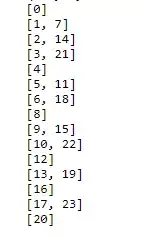I was trying to factor $x^{24}-1$ in $\mathbb{F}_7[x]$, however I ran into some trouble while trying to find certain coefficients of the irreducible polynomials.
My effort:
I computed the cyclotomic cosets modulo $24$ when $q=7$, and got the list below:
Thus, $\{0,1,2,3,4,5,6,8,9,10,12,13,16,17,20\}$ is a list of representatives. Since $24 |7^2-1$, we take a primitive element $\alpha$ of $\mathbb{F}_{49}$, and the factorization will be of the form
\begin{equation*} x^n-1=\prod_{i=1}^{15} M^{\left(2 s_i \right)}(x), \end{equation*}
where $s_i$ is the $i$-th representative and $M$ is the respective minimal polynomial of $\alpha^{2s_i}$ with respect to $\mathbb{F}_7$. For example, \begin{equation*} M^{(0)}(x)=x-\alpha^0=x-1. \end{equation*}
and
\begin{equation*} M^{(2)}(x)=(x-\alpha^2)(x-\alpha^{14})=x-(\alpha^2+\alpha^{14})+\alpha^{16}. \end{equation*}
How would I then be able to simplify $\alpha^2+\alpha^{14}$ and $\alpha^{16}$? No need for a full answer (I'd like to solve it myself), only an idea on how to proceed.
